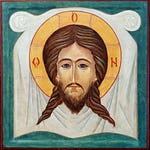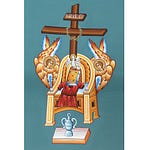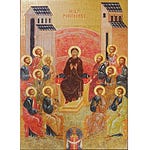Let us look closely and examine our Gospel passage for its power and its symbolism. When Saint John the Evangelist was going to write about the mystery of our Lord, in which He washed the feet of His disciples at the Passover meal before He went forth to His Passion, John first took care to make clear what the name “Passover” mystically expressed. Passover means passing over. It derives its ancient name from the Lord’s passing over on this day through Egypt, striking the first-born of the Egyptians and freeing the children of Israel, and from the children of Israel’s passing over on that night from their slavery in Egypt, in order that they might come to the land which had once been promised to their heirs. Mystically it signifies that on this day our Lord would pass over from this world to His Father; and that, following His example, the faithful, having cast off the temptations of the flesh, the world, and the Devil by their continual practice of the virtues, should be able to pass over from the life of bondage to sin to the life of new creation in Christ Who is our beginning and Who is our end.
Saint John says, “Since He had loved His own who were in the world, He loved them to the end”; that is, Jesus loved them so much that by that same love He would end His bodily life from a time, and He would soon pass from death to life, from this world to His Father. Saint John then says, “And during supper, when the devil had already put it into the heart of Judas Iscariot, Simon’s son, to betray him, Jesus, knowing that the Father had given all things into his hands, and that he had come from God and was going to God, rose from supper, laid aside his garments.” When S. John recalls the eternity of His divine power to teach us that Jesus is both true God and true man, and to remind us by Christ’s commands that the greater we are, the more we should humble ourselves in everything. Jesus was truly human because He could touch and wash the feet of other human beings, be handed over by another human being, and be crucified by human beings; Jesus was truly God because into His hands the Father had given everything; He had come from God, and He was returning to God.
Our Lord knew that the Devil had put it into the heart of Judas to hand Him over. He knew that by His power He would turn their wickedness into good. And as a further indication of His great compassion toward us, and as an example of His great humility for us to follow, He rose from the table, put aside His garments, and washed His disciples’ feet, fulfilling the office not of the Lord God but that of a servant. He even humbly washed the feet of the one whose hands He knew woul betray Him.
Let us as well savor this most humble mystery of our Saviour at a more profound level. For the sacred meal itself at which our Lord reclined with His disciples, the Last Supper as is called, the Institution of the Eucharist: this symbolizes in microcosm the entirety of His three years of public ministry. Over this time, He Himself fed everyone far and wide with the banquet of His saving words and the sweetness of His miracles and healings, and was Himself fed by the faith and love of those who heard Him.
Furthermore, His rising from the table and putting aside His garments signifies His ceasing of sharing His human life with human beings, and His willing and voluntary entrance into His Passion. His taking up of a linen towel, with which He girded Himself, signifies His having taken up for us the mandate of suffering which He had received from His Father: His body soon to be covered with the torment and suffering of His Passion.
His pouring of water into a basin, to wash His disciples’ feet and to dry them with the linen cloth with which He was girded, signifies after His death on the Cross, His pouring forth onto the ground of water along with blood which flowed freely from His side. With these He would cleanse His believers, strengthen His believers, and sanctify their works by the sacramental mystery of His Passion and His Holy Sacrifice. With His Blood and Water create the Church and the Sacraments.
Our Lord said, “If I then, your Lord and Teacher, have washed your feet, you also ought to wash one another’s feet.” There is in this a general sense which applies to all Christians, and a particular sense that applies to a few. Its general sense is that we should serve each other in charity, not only by washing the feet of our brothers and sisters, but also by aiding them in any of their needs. It means, in short, the priesthood of all believers, given the responsibility of prayer and charity toward the whole world.
The particular sense is that in the Upper Room and through the washing of their feet, the twelve disciples receive a new status, the status of priests. It is the Institution of the Sacred Order of Priesthood. This is seen by interpreting Scripture rightly. Consider the priestly Day of Atonement ritual described in Leviticus 16: “Then Aaron shall come into the tent of meeting, and shall put off the linen garments which he put on when he went into the holy place, and shall leave them there; and he shall bathe his body in water in a holy place, and put on his garments, and come forth, and offer his burnt offering and the burnt offering of the people, and make atonement for himself and for the people.”
Observe the pattern: The high priest undresses, bathes, dresses, and offers sacrifice. It is the same pattern found in John 13: Jesus undresses (v. 4), washes the disciples’ feet (“bathes them”) (v. 5-11), dresses (v. 12), and will soon offer himself in sacrifice, a sacrifice they as Priests will offer sacramentally at the Altar. Whereas in Leviticus the high priest washes all of himself, in John, Jesus washes the feet of the disciples. Jesus is sharing his high priesthood with the disciples; He must wash them—that is, ordain them as priests—lest they have “no part” in his own priesthood, as the person Who offers Sacrifice, as the priest does during the Eucharist.
Brothers and sisters, to be obedient to Christ is to keep His commandments. Just as Christ laid down His life for us, so we also, if the occasion arises, should lay down our life for our brothers and sisters: whether lay or ordained, we are to imitate His humility and service. After we have kept His commandments and imitated His humility and service, may He bring us to the blessedness of the everlasting sight of Him, Jesus Christ, our Lord and God, Who lives and reigns with the Father in the unity of the Holy Ghost, ever one God, world without end. Amen.











Share this post